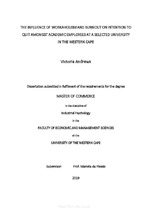| dc.description.abstract | Universities worldwide have to contend with a changing landscape due to the massification of education, additional pressure being placed on academia with respect to research outputs, teaching a transforming student base, along with political and social pressures. In South Africa, in particular, there has been increasing pressure on government to effect socio-political and legislative changes to ensure that those that were previously disadvantaged are granted free educational opportunities. Within an academic milieu, talent retention of staff at higher education institutions (HEIs) in South Africa has become a challenge.
Research highlights many changes in the nature of work over the past few decades, including an increasingly prevalent culture of long working hours and increasing work intensity across many sectors. Within academia, recent research indicates a culture of increasing work intensity over time often combined with decreasing resources and competing demands. Once assumed to be a low-pressure job, research reports that significant mind set shifts have been needed within academia in order to cope with the heavy workloads, administrative, teaching, community outreach and publishing requirements and expectations within this group of employees. These additional expectations are likely to result in burnout, which is defined as a prolonged response or “‘psychological syndrome’” in response to chronic interpersonal stressors on the job. Burnout affects all professions but tends to be more pervasive in human service occupations such as education. Despite this evident recognition, there is a paucity of research on burnout among South African academics. Amongst the studies conducted, however, evidence suggests that burnout is escalating, and consequently academic careers are becoming less attractive.
The extant research reveals that the repercussions of burnout are accompanied by declines in mental and physical health, low morale, substance abuse, weakening of interpersonal relationships, deterioration in teaching and research performance, increased absenteeism and ultimately considerations of leaving the profession. This is likely to be exacerbated in those academics who display a propensity towards workaholism. Workaholism has become a prevalent phenomenon within organisations, which needs to be managed more effectively to offset its damaging effects on employee health and productivity. Associations have been established between workaholism, absenteeism, psychological ill -health, physical ill ill-health, stress and burnout. Faced with increasing professional and operational challenges, academics may develop the resultant impact and be inclined to intend to quit.
The main objective of the research study was to determine the relationship between workaholism and burnout on the intention to quit amongst academic employees at a uUniversity in the Western Cape. A quantitative method was used to generate the result by means of survey distribution to the targeted population. Convenience sampling was used to select academic staff in the study. Questionnaires were sent electronically and an additional one hundred and fifty 150 hardcopy questionnaires were administered. Fifty-three responses were received electronically, and fifty-three53 hardcopy completed questionnaires. In total, one hundred and six106 questionnaires were completed, of which one hundred 100 questionnaires were used for the study.
The surveys included a biographical questionnaire, Workaholism Analysis Questionnaire (WAQ) (2013), the Maslach Burnout Inventory (MBI) (1981) and the Turnover Intentions Questionnaire (TIQ) (2008). The results indicated that there is a significant positive relationship between Eemotional Eexhaustion and turnover, Eemotional Eexhaustion and workaholism, Ddepersonalisation and workaholism, and workaholism and turnover intention. In addition, the results further indicated a strong negative relationship between Ppersonal Aaccomplishment and Tturnover Iintention. The results further showed that a medium positive relationship between Ddepersonalisation and turnover intention exists. The regression analysis indicated that a significant proportion of the variance in turnover intention is explained by Eemotional Eexhaustion. Conclusions were drawn, and recommendations are made to the uUniversity in order to address this potential problem. | en_US |

